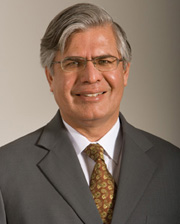Dr. Aneel Karnani, whose August WSJ op/ed (“The Case Against Corporate Social Responsibility”) argued that CSR has no relevance in today’s global business world, was provided with an ample opportunity yesterday to clarify his thesis along with a panel of CSR experts and business journalists. “CSR and the Role of Business Today” was presented via webcast by Fenton along with its partners CSRwire, The Paley Center for Media and BSR. The webcast can be viewed for the next 90 days.
The CSR space owes Dr. Karnani a debt of gratitude. Indeed, his piece and yesterday’s panel support the adage: “No such thing as bad PR.” While the arguments he provided that characterized CSR as “dangerous” and “undemocratic” were unconvincing, Dr. Karnani was effective in suggesting that leading proponents of CSR need to do a better job of clarifying what CSR is and what CSR is not.
Here are a few of Karnani’s main points:
- CSR has become a vehicle to apologize for business. Business is the central source for global value creation and has nothing to apologize for.
- CSR interferes with free market principles (Smith, Friedman) which makes it dangerous and irrelevant.
- Government not business should regulate market failures. Business can’t solve global problems like poverty or climate change.
- If CSR demonstrably increases shareholder value, then that is simply good management. “I’ve been saying this long before these CSR people arrived. That is simply Milton Friedman!”
A key conflict in yesterday’s conversation was one of scope — Dr. Karnani believes CSR interferes with government regulation of market failures (e.g., externalities like GHG emissions), whereas virtually everyone else on the panel argued that CSR can act as a compliment to regulation and not as a substitute, particularly in developing economies when governance often lags business leadership.
Adding forceful, though rarely robust and evidence-based support for Dr. Karnani’s position, was Chrystia Freeland of ThomsonReuters, whose Washington Post op/ed last July posited that it was the “fetish” of the CSR industry that helped lead to the BP disaster in the Gulf. Just as Karnani argued that CSR was an irrelevant distraction from the undisputed role of business to create value for society and its shareholders, Freeland lambasted the field suggesting that it distracted consumers from inherent and myriad conflicts between commerce and society. Freeland thoughtfully argued that business is not simply interested in pursuing the common good and gave a credible example of Pepsi lobbying against the soda tax.
It would have been nice to have someone form Pepsi’s CSR team on hand to respond, but interestingly enough, both Bob Corcoran of GE and Dave Stangis of the Campbell Soup Company essentially agreed with Freeland on that point. Stangis went on to recount his first meeting with Campbell’s Board when he told them “he was not a tree-hugger but a capitalist.” Corcoran explained that GE pursues socially responsible investments – efficient energy portfolio innovation – when they feel confident they will pay long-term dividends.
Once it was agreed that today CSR is conceived as a core business strategy as opposed to philanthropy or brand enhancing “initiatives,” there were less quarrels. Karnani sees integrated CSR as simply “good management.” This is maybe where his rant against CSR is more of a semantics war than anything else.
The promise and objective of CSR is unquestionably good management and long-term value creation. Whether or not it always delivers is a valid question.
Karnani raises reasonable probing points about the role and materiality of CSR. However, I think he falls flat when he says CSR has no role in regulatory advancement. Clearly global governance has lagged behind the integration of global markets, as ICT innovation and globalization soar. For a self-proclaimed conservative, Karnani has an abundance of faith in governments staying ahead of business to provide public goods.






